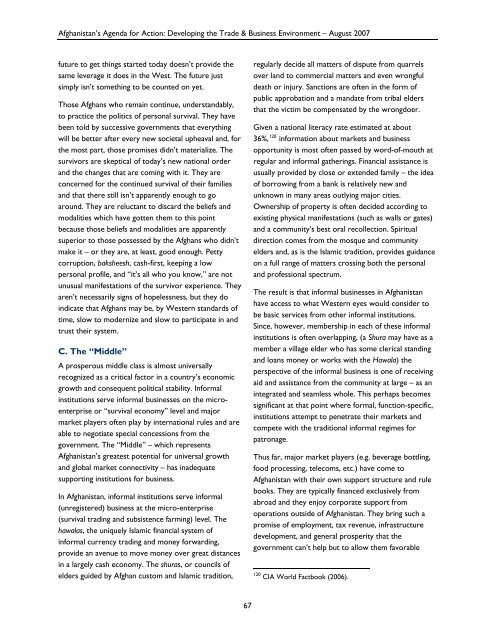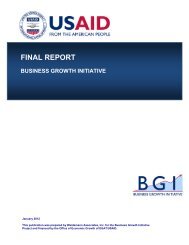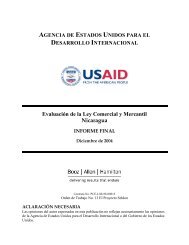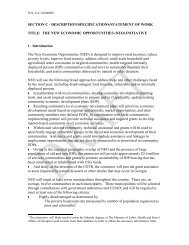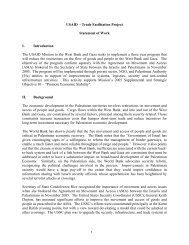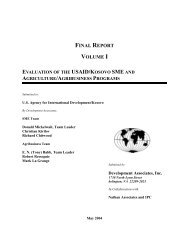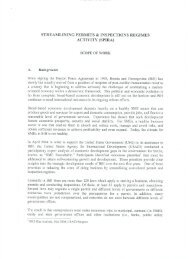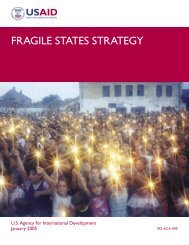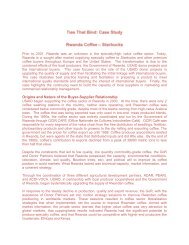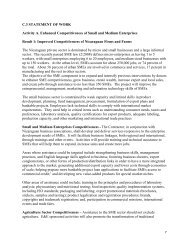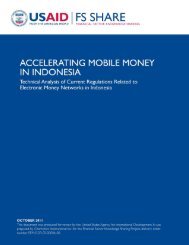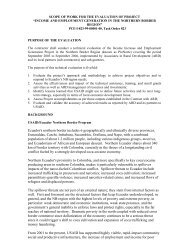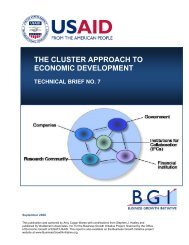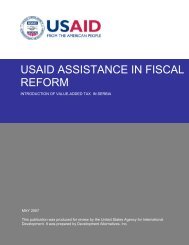Afghanistan's Agenda for Action - Economic Growth - usaid
Afghanistan's Agenda for Action - Economic Growth - usaid
Afghanistan's Agenda for Action - Economic Growth - usaid
You also want an ePaper? Increase the reach of your titles
YUMPU automatically turns print PDFs into web optimized ePapers that Google loves.
Afghanistan’s <strong>Agenda</strong> <strong>for</strong> <strong>Action</strong>: Developing the Trade & Business Environment – August 2007future to get things started today doesn’t provide thesame leverage it does in the West. The future justsimply isn’t something to be counted on yet.Those Afghans who remain continue, understandably,to practice the politics of personal survival. They havebeen told by successive governments that everythingwill be better after every new societal upheaval and, <strong>for</strong>the most part, those promises didn’t materialize. Thesurvivors are skeptical of today’s new national orderand the changes that are coming with it. They areconcerned <strong>for</strong> the continued survival of their familiesand that there still isn’t apparently enough to goaround. They are reluctant to discard the beliefs andmodalities which have gotten them to this pointbecause those beliefs and modalities are apparentlysuperior to those possessed by the Afghans who didn’tmake it – or they are, at least, good enough. Pettycorruption, baksheesh, cash-first, keeping a lowpersonal profile, and “it’s all who you know,” are notunusual manifestations of the survivor experience. Theyaren’t necessarily signs of hopelessness, but they doindicate that Afghans may be, by Western standards oftime, slow to modernize and slow to participate in andtrust their system.C. The “Middle”A prosperous middle class is almost universallyrecognized as a critical factor in a country’s economicgrowth and consequent political stability. In<strong>for</strong>malinstitutions serve in<strong>for</strong>mal businesses on the microenterpriseor “survival economy” level and majormarket players often play by international rules and areable to negotiate special concessions from thegovernment. The “Middle” – which representsAfghanistan’s greatest potential <strong>for</strong> universal growthand global market connectivity – has inadequatesupporting institutions <strong>for</strong> business.In Afghanistan, in<strong>for</strong>mal institutions serve in<strong>for</strong>mal(unregistered) business at the micro-enterprise(survival trading and subsistence farming) level. Thehawalas, the uniquely Islamic financial system ofin<strong>for</strong>mal currency trading and money <strong>for</strong>warding,provide an avenue to move money over great distancesin a largely cash economy. The shuras, or councils ofelders guided by Afghan custom and Islamic tradition,regularly decide all matters of dispute from quarrelsover land to commercial matters and even wrongfuldeath or injury. Sanctions are often in the <strong>for</strong>m ofpublic approbation and a mandate from tribal eldersthat the victim be compensated by the wrongdoer.Given a national literacy rate estimated at about36%, 120 in<strong>for</strong>mation about markets and businessopportunity is most often passed by word-of-mouth atregular and in<strong>for</strong>mal gatherings. Financial assistance isusually provided by close or extended family – the ideaof borrowing from a bank is relatively new andunknown in many areas outlying major cities.Ownership of property is often decided according toexisting physical manifestations (such as walls or gates)and a community’s best oral recollection. Spiritualdirection comes from the mosque and communityelders and, as is the Islamic tradition, provides guidanceon a full range of matters crossing both the personaland professional spectrum.The result is that in<strong>for</strong>mal businesses in Afghanistanhave access to what Western eyes would consider tobe basic services from other in<strong>for</strong>mal institutions.Since, however, membership in each of these in<strong>for</strong>malinstitutions is often overlapping, (a Shura may have as amember a village elder who has some clerical standingand loans money or works with the Hawala) theperspective of the in<strong>for</strong>mal business is one of receivingaid and assistance from the community at large – as anintegrated and seamless whole. This perhaps becomessignificant at that point where <strong>for</strong>mal, function-specific,institutions attempt to penetrate their markets andcompete with the traditional in<strong>for</strong>mal regimes <strong>for</strong>patronage.Thus far, major market players (e.g. beverage bottling,food processing, telecoms, etc.) have come toAfghanistan with their own support structure and rulebooks. They are typically financed exclusively fromabroad and they enjoy corporate support fromoperations outside of Afghanistan. They bring such apromise of employment, tax revenue, infrastructuredevelopment, and general prosperity that thegovernment can’t help but to allow them favorable120 CIA World Factbook (2006).67


